
Lift truck operators are often on the trucks more than 7 out of 8 hours per day in some forklift corporations. Operators would be asked to constantly load and unload trucks the whole day. Many of these operators do not have to consult with supervisors really often, neither do they have to deal with paperwork. Sometimes they are doing the same task during the shift for the duration and they don't even need to move the forks to adapt to different loads. These operators normally find the forklift counterbalance sit-down units more efficient and comfortable.
Maneuvering space depending on the place, several facilities have a lot of space wherein lift trucks and equipment could operate in. In these situations, an engine powered or 4-wheel electric lift truck remains an essential player in the warehousing fleet.
Then again, other facilities are packed to capacity. These facilities might have shipping departments and staging areas that provide limited room for lift truck maneuverability. In this specific situation, a 3-wheel electric or stand-up end control lift truck units could appear to be a better choice.
Depending on your specific use and setting you are working in, you could then determine how to choose the right truck and choose the correct tire. Next is a brief profile to show you the kind of tire choices available.
Cushion Tire Trucks - The cushion tire has been specially designed for use on both concrete or asphalt surfaces. Usually, they are specified for indoor application inside distribution centres, warehouses and manufacturing facilities. Typically cushion tire forklifts are smaller than similar capacity pneumatic units; therefore, they usually cost less. This makes their resale value a lot lower as well.
Pneumatic Tire Trucks - On improved surfaces, the pneumatic tire forklift can operate outdoors and indoors as long as these surfaces comprise hard-packed dirt or stones and blacktop. Rough terrain locations like severely plowed fields or potholed lots are not ideal. The trucks are outfitted with a larger frame. Typically, pneumatic tire trucks are more pricey compared to cushion tire units. When it comes to resale, normally the pneumatic models provide higher value. This is in part because of their overall surface versatility and the large amount of maneuvering space they provide.